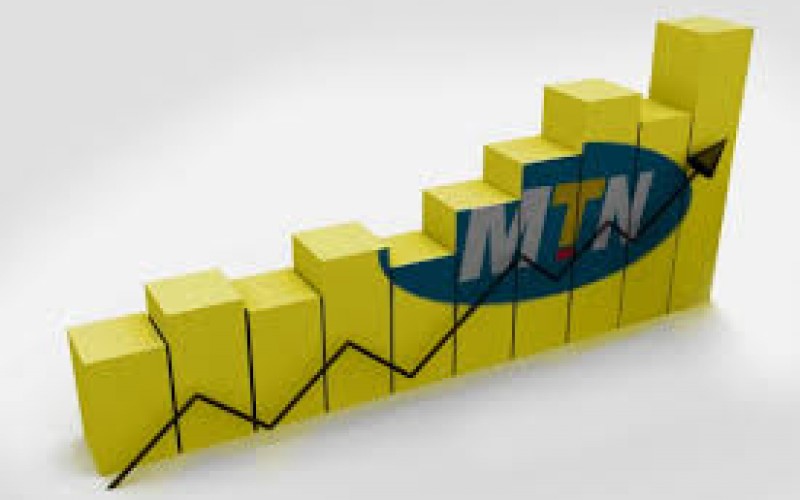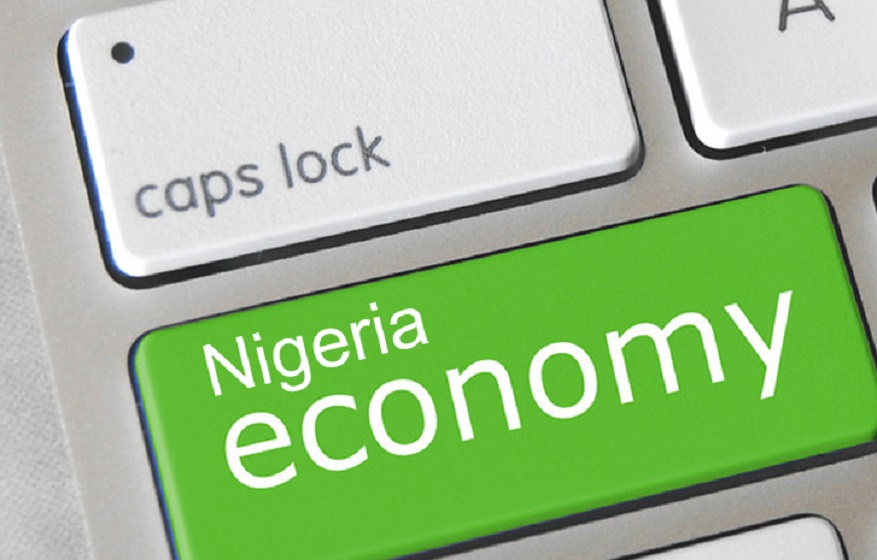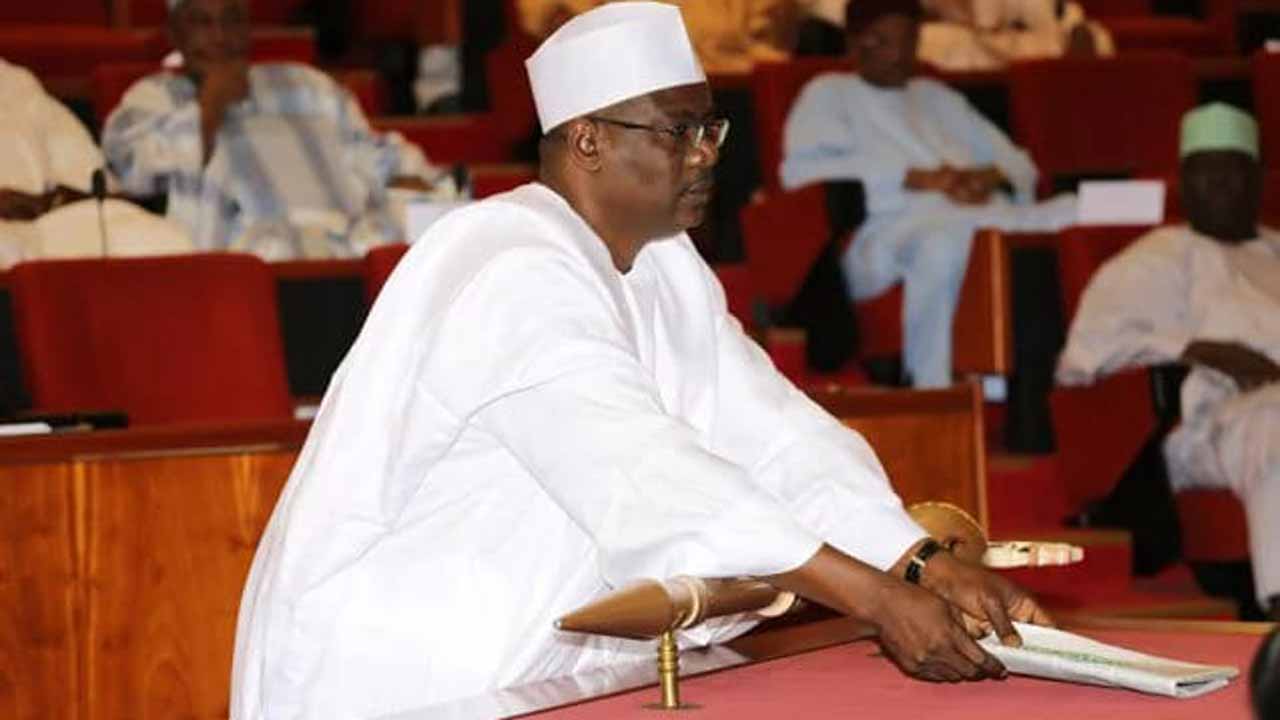Economy
MTN to List N153b Shares on NSE Soon

By Modupe Gbadeyanka
South African firm, MTN Nigeria, is planning to finally list its shares worth about N153 billion ($500 million) on the Nigerian Stock Exchange (NSE) before the end of first half of this year.
The leading telecommunications company in Nigeria had suspended listing of its stock on the local bourse because of the fine imposed on it by the Nigerian government in 2016 for failing to disconnect unregistered lines on its platform.
It was initially fined N1.04 trillion, but was later reduced to N330 billion.
That year, the firm posted its first loss as a result of the punishment.
However, MTN Group returned to profitability in 2017 when it recorded profit gain during the year.
According to Bloomberg, MTN is listing the N153 billion worth of its equities on NSE as part of the deal it struck when its fine was cut by the Nigerian Communications Commission (NCC), the agency regulating the telecoms sector in the Africa’s largest market.
Bloomberg is reporting that Standard Bank Group Limited and Citigroup Incorporated are advisers of MTN Group on the disposal of as much as 30 percent of the Lagos-based unit on the local bourse.
It was gathered that most of the equities would be sold to local institutions and individuals, though foreign investors could be brought in to ensure the process is a success.
Last year, precisely in August, the Securities and Exchange Commission (SEC) confirmed that talks were ongoing in listing the company’s shares on the stock exchange.
“Concerning listing of MTN (Nigeria) on the Nigerian Stock Exchange, we have started discussions with them and also given them ideas on how to make it possible.
“We hope very soon, when the discussions are over, the company will announce its listing to investing public.
“I believe it (the listing) will boost our economy and showcase Nigeria as a good place to invest,” the then SEC chief, Mr Mounir Gwarzo, had informed journalists after a Capital Market Committee (CMC) meeting in Lagos.
In June last year, General Manager of MTN, Mr Nikiwe Tsaagane, had assured the Federal Government that the leading telecommunications firm in the country will list its shares on the Nigerian Stock Exchange (NSE).
He had told the Minister of Science and Technology, Mr Ogbonnaya Onu, that plans were underway to make shareholders apply for the listing digitally.
“To achieve this, we are working with the Nigeria Stock Exchange to develop an application platform to enable our customers apply online. It would be the first time such is happening in the country,” Mr Tsaagane informed the Minister.
In November 2017, Chief Executive Officer (CEO) of MTN Group, Mr Rob Shuter, had told Bloomberg in an interview that his firm was making underground plans for an initial public offering of its Nigerian business and should had been completed in the next six months.
According to him, “We have a lot of advisers running around getting everything ready, it is a complicated process and there’s a lot of regulation that needs to be arranged. We are moving forward well with the project and anticipate concluding that in the next six months or so.”
Economy
NASD Index Adds 0.37% as Market Cap Dips N19bn in Week 51

By Adedapo Adesanya
The NASD Over-the-Counter (OTC) Securities Exchange appreciated by 0.37 per cent in the 51st trading week of 2024, with the Unlisted Security Index (USI) growing in the five-day trading week by 11.11 points to settle at 3,043.27 points, in contrast to the preceding week’s 3,032.16 points.
However, the market capitalisation of the bourse went down by N19.45 million to N1.043 trillion from the N1.062 trillion recorded in the preceding week, which was Week 50.
Business Post reports that there were price four gainers and three price losers, indicating a positive market breadth index.
The gainers were led by Okitipupa Plc with a price appreciation of 10 per cent to close at N32.72 per unit versus the previous week’s N29.74 per unit, UBN Property jumped by 5.00 per cent to end at N1.89 per unit compared with the preceding trading value of N1.8 per unit, FrieslandCampina Wamco Nigeria Plc rose by 2.3 per cent to sell at N43.84 per share versus the preceding week’s N42.85 per share, and Nipco Plc gained 2.1 per cent to quote at N150.10 per share against the former value of N147.00 per share.
On the flip side, Industrial and General Insurance (IGI) Plc depreciated by 5.6 per cent to close at 17 Kobo per unit versus 18 Kobo per unit, Afriland Properties Plc recorded a 1.9 per cent slide to end at N15.99 per share versus N16.30 per share, and Geo-Fluids Plc lost 0.8 per cent to end at N3.88 per share against the N3.91 per share it was transacted a week earlier.
There was a 79.4 per cent slide in the volume of equities transacted in Week 51 to 2.29 million units from 11.12 million units in the previous week, the value of trades went up by 136.9 per cent to N89.8 million from N37.9 million, and the number of deals stood at 93 deals.
FrieslandCampina Wamco Nigeria Plc was the most active stock by value last week with N53.1 million, Nipco Plc recorded N30.1 million, Afriland Properties Plc posted N2.6 million, Geo-Fluids Plc traded N1.5 million, and 11 Plc achieved N0.96 million.
Also, FrieslandCampina Wamco Plc was also the most traded stock by volume in the week with 1.22 million units, UBN Property Plc transacted 0.2 million units, and Afriland Plc traded 0.16 million units.
Economy
Nigeria’s Economy Grew 3.46% in Q3 2024 With N20.1trn—CBN

By Adedapo Adesanya
Nigeria’s Gross Domestic Product (GDP), as computed by the Central Bank of Nigeria (CBN), expanded by 3.4 per cent in the third quarter (Q3) of 2024, with output reaching N20.115 trillion, different from the 3.19 per cent growth quoted in Q2 2024 from an output of N18.285 trillion, according to the latest Economic Report for the third quarter of 2024 released by the apex bank.
The CBN said despite persisting headwinds, this growth was driven mainly by the non-oil sector.
The report said inflation moderated during the quarter, reflecting the fall in the food component of the Consumer Price Index (CPI) basket, and driven by the restrictive monetary policy stance.
Domestic crude oil production increased, following enhanced security measures around oil pipeline infrastructure in the Niger Delta region.
The growth of 3.46 per cent recorded in Q32024, represented the third consecutive expansion year-to-date surpassing the 3.19 per cent and 2.54 per cent recorded in Q2 2024 and the corresponding quarter of 2023, respectively.
“Growth was on account of continued efforts to improve the business environment, streamline cumbersome business processes and deepen the quality of business infrastructure,” the report seen by Business Post said.
The 24-month window period opened for the banking sector re-capitalisation (according to their license category and authorisation) supported the robust growth in the services sector, particularly, the finance and insurance sub-sector, the report explained.
The continued drive of the government to improve crude oil production to a target of 2 million barrels per day by year-end of 2024, helped the oil sector to maintain positive growth for the fourth consecutive quarter.
Thus, the oil sector grew by 5.17 per cent (year-on-year) in Q3 2024, compared with a growth of 10.15 per cent in the preceding quarter, and contributed 0.28 percentage points to the overall increase in the period under review.
The performance was slower than the preceding quarter, owing to a drop in prices of Nigeria’s Bonny Light crude in the international market, to $82.07 per barrel from $86.92 per barrel in Q22024.
However, with the increase in crude oil production from 1.27 million barrels per day in Q22024 to 1.33 million barrels per day in Q3 2024.
The non-oil sector growth accelerated to 3.37 per cent in Q32024 compared with a growth rate of 2.80 per cent in the preceding quarter, contributing 3.18 percentage points to total growth.
The expansion of the non-oil sector was driven by the performance of the financial & insurance, information & communication, crop production, trade, transportation & storage, and real estate sub-sectors.
Regarding sectoral performance, CBN said all the sectors, (agriculture, industry and services) grew in Q32024.
The Services sector expanded at the fastest pace by 5.19 per cent in Q32024, compared with 3.79 per cent in Q2 2024 and 3.99 per cent in Q32023, remaining the most dominant sector and accounting for 53.58 per cent of aggregate Gross Domestic Product.
Within the services sector, financial & insurance sub-sector grew by 30.83 per cent, compared with 28.79 and 28.21 per cent in the preceding and corresponding quarters of 2023, respectively. This performance was spurred by gains from the recapitalisation exercise that was announced by the CBN, according to the report.
Other factors such as profits from interest gains (following continued hikes in interest rates), consultancy fees, and ATM & transfer fees contributed to the growth of the sub-sector.
Also, given the financial sector’s ongoing digital transformation (including the significant growth of fintech companies, mobile banking, and digital payment systems), the information and communications subsector grew by 5.92 per cent (contributing 0.95 percentage points to GDP growth).
The performance of the ICT sub-sector was further boosted by the ongoing demand for digital services like e-commerce and data/internet services, which helped to grow economic activity in the other sub-sectors like trade and real estate 0.65 and 0.68 per cent, respectively.
The transport and storage sub-sector grew by 12.15 per cent, compared with contractions of 13.53 and 35.85 per cent in the preceding and corresponding quarters of 2023, respectively.
The growth was driven by the increase in road transport owing to improved security conditions and substitution from air transport (due to higher air fares). Also, sustained investments in road infrastructure, as well as investments in alternative sources of energy (CNG) for road transport contributed to the uptick in the sub-sector.
The agriculture sector grew modestly by 1.14 per cent, compared with 1.41 and 1.30 per cent in the preceding and corresponding quarters of 2023, respectively.
The growth was driven by the favourable weather conditions and increased harvests of some staples.
Crop production grew by 1.18 per cent, compared with1.65 per cent in Q22024, while the forestry and livestock sub-sectors grew by 2.23 and 1.03 per cent, respectively, compared with a growth of 2.77 per cent and a contraction of 1.71 per cent in Q22024.
Economy
Ndume Insists on Tax Bills Withdrawal, Calls For Governance Reforms

By Adedapo Adesanya
One of the fiercest critics of the tax reform bills, Mr Ali Ndume, has insisted on the withdrawal of the entire process, saying it is coming at a time the Nigerian economy is in crisis.
The former Leader of the Senate declared on Sunday that the North is not parasitic in nature, particularly when matters of economic survival are concerned.
President Bola Tinubu in September transmitted four tax bills to the parliament for approval. These are the Nigeria Tax Bill 2024, the Tax Administration Bill, the Nigeria Revenue Service Establishment Bill, and the Joint Revenue Board Establishment Bill.
The bills have generated controversies since they were forwarded to the legislative arm of government and earlier this month, President Tinubu directed that the concerns be addressed.
Northern statesmen have since advised Mr Tinubu to hold on before pushing the controversial tax reform bills, claiming they will not favour the region.
In particular, Mr Ndume, who represents Borno South Senatorial District in the National Assembly, noted that all states, zones and regions in the country need each other to survive no matter how economically advantaged they are.
“The North was, is and will never be a parasite or dependent on any region or even the country. We are assets not liability to Nigeria. Those who think that the current tax reforms is only against Northern interests are naive. As it is the law is against all the low and middle-income Nigerians,” he stressed.
He insisted that the tax reform bills were coming at the wrong time, and said the economic hardship being suffered by Nigerians may get worse.
“I’m still insisting that the Tax Reforms Bills be withdrawn for more consultations and by-in of critical stakeholders like state, local government and private sectors,” Mr Ndume said.
He advised that the Federal Inland Revenue Service (FIRS) should expand its tax net just as he called for greater demonstration of accountability.
“The FIRS should concentrate on expanding the tax net and collecting more. Also, accountability and transparency should be increased,” he stated.
Mr Ndume also called on the Central Bank of Nigeria (CBN) to beam its searchlight on commercial banks to ensure that banks which declare huge profits every year should pay more taxes.
Ndume outlined his concerns with the bills, citing issues such as the wrong timing, the question of derivation, Value Added Tax, and the lack of consensus or buy-in from Nigerians.
According to him, “Yes, reform. But even with reforms, you have to prioritise, time it correctly, and ensure the buy-in of Nigerians because this is a democracy. It is the government of the people, for the people, and by the people.
“First in Nigeria, what we need to do is reform the government. Our personnel and overhead expenditure for 2024 is about 50 to 60 per cent of the budget itself. We are here in November, and 20 per cent of the budget has not been implemented. But if you check the recurrent expenditure, it has already been exhausted.
“So, that means over 15 to 20 trillion Naira is going into personnel, debt servicing, and recurrent expenditure. We should reform the government, not only the Executive – we need to reform the government holistically,” he added.
-

 Feature/OPED5 years ago
Feature/OPED5 years agoDavos was Different this year
-
Travel/Tourism8 years ago
Lagos Seals Western Lodge Hotel In Ikorodu
-

 Showbiz2 years ago
Showbiz2 years agoEstranged Lover Releases Videos of Empress Njamah Bathing
-

 Banking6 years ago
Banking6 years agoSort Codes of GTBank Branches in Nigeria
-

 Economy2 years ago
Economy2 years agoSubsidy Removal: CNG at N130 Per Litre Cheaper Than Petrol—IPMAN
-

 Banking2 years ago
Banking2 years agoFirst Bank Announces Planned Downtime
-

 Sports2 years ago
Sports2 years agoHighest Paid Nigerian Footballer – How Much Do Nigerian Footballers Earn
-

 Technology4 years ago
Technology4 years agoHow To Link Your MTN, Airtel, Glo, 9mobile Lines to NIN























